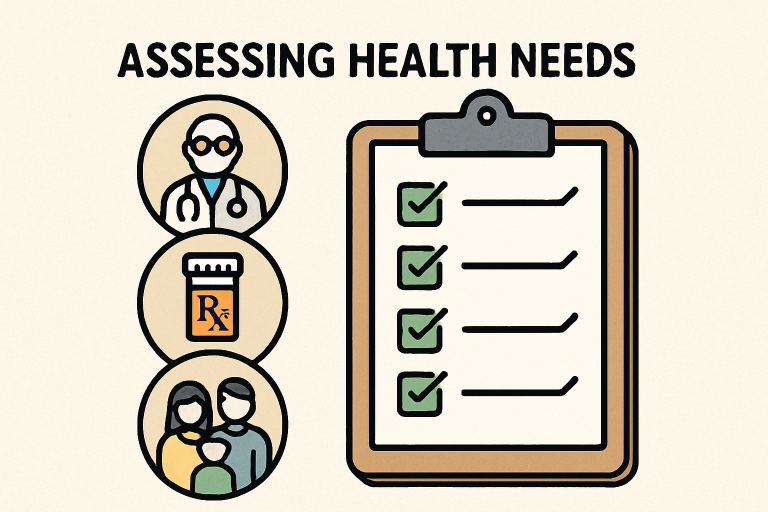Table of Contents
Introduction
Choosing a health insurance plan is more than just a monthly premium—it’s a decision that can influence your access to care, finances, and peace of mind throughout the year. With so many options available, making the right decision can feel overwhelming. Still, being methodical and informed allows you to select a plan that genuinely supports your health needs and budget. Exploring resources like Insurance ‘n You can provide valuable insights and up-to-date information tailored to your specific state or region, ensuring you get the latest guidance and plan recommendations.
Assessing plan features, understanding what’s included, and comparing networks are all part of a process that pays off in convenience and cost savings. It’s essential to avoid common pitfalls, such as overlooking prescription coverage or ignoring out-of-pocket limits. Leveraging expert-backed advice and credible resources is the first step to protecting your health and financial security. Before diving into specific options, let’s break down the key elements for an optimal health insurance choice.
Assess Your Healthcare Needs
Identifying what you and your family need from a health plan is the foundational step toward a wise insurance decision. Ask yourself how often you visit the doctor, whether you have chronic conditions, and if you take any ongoing prescriptions. Consider upcoming life events—such as planned surgeries, pregnancies, or changing family dynamics—that might affect your medical usage in the year ahead.
- How regularly do you or your dependents need physician care?
- Are there any ongoing medical issues like diabetes or asthma to account for?
- What medications do you take regularly, and how expensive are they without insurance?
- Do you anticipate specialist visits or elective procedures?
A thorough assessment like this will clarify the level of coverage, deductible, and network you need for the year.

Understand Different Plan Types
Health insurance has several main plan types, each with distinctive features and flexibility. Familiarize yourself with their pros and cons to select the best fit for your needs:
- Health Maintenance Organization (HMO): This plan requires enrollees to select a primary care physician who manages care and issues specialist referrals. It limits care to network providers, often with lower premiums and out-of-pocket costs.
- Preferred Provider Organization (PPO): Allows greater freedom in choosing providers, including out-of-network options, usually without referrals. This flexibility typically results in higher premiums and out-of-network costs.
- Exclusive Provider Organization (EPO): This type of organization offers no coverage for out-of-network care (except emergencies) but skips the referral process, combining some HMO and PPO attributes.
- Point of Service (POS): A hybrid, requiring referrals like an HMO but offering partial out-of-network care like a PPO.
Consider your preferences for doctor choice versus potential savings—a plan that emphasizes network providers generally offers lower costs but less flexibility.
Evaluate Provider Networks
Don’t assume all your preferred healthcare providers are included with every plan. Insurers negotiate with specific doctors, clinics, and hospitals, creating a network that keeps costs manageable. Confirm your current doctor—especially any specialists—are part of the network before selecting a plan. Using out-of-network care can mean substantially higher costs or, in some cases, denied claims. Understanding network rules and exclusions can prevent unwelcome surprises after you’re enrolled.
Review Prescription Drug Coverage
Prescription medication can quickly become the most considerable out-of-pocket cost for many people. Each insurance plan maintains a “formulary”—a list of covered medicines divided into pricing tiers. Review the formulary to check that your prescriptions are included and note whether they are categorized as generic, preferred brand, or specialty drugs, as your share of the cost may vary significantly. Watch for requirements like prior authorizations or step therapy protocols. Resources like HealthCare.gov provide comprehensive guidance on navigating plan drug coverage and formularies to avoid expensive gaps.
Consider Additional Benefits
Health insurance plans often provide more than just doctor visits and hospital stays. Look beyond the basics for services that add value to your coverage:
- Telemedicine—remote consultations with a doctor or specialist
- Wellness and preventive health incentive programs
- Mental health and substance use disorder treatments
- Vision and dental benefits (sometimes included or available as add-ons)
These extra benefits can make a significant difference, especially if you prioritize convenience, mental health support, or holistic wellness.
Compare Costs
A comprehensive health plan is only valuable if it fits within your budget. Don’t just look at the monthly premium—factor in the deductible, copayments, coinsurance, and most importantly, the annual out-of-pocket maximum. Plans with low premiums often have higher out-of-pocket costs, which may be a poor fit for frequent healthcare users. On the other hand, high-deductible plans can pair well with health savings accounts (HSAs) for people mainly concerned with catastrophic coverage. Tools from ample financial resources like Investopedia can help you understand these variables and estimate total annual costs.
Check Enrollment Periods
Missing the health insurance enrollment window may leave you without coverage for the year, unless you qualify for special enrollment due to life changes—marriage, having a baby, or losing other coverage. Make note of open enrollment dates for your state or federal marketplace and set reminders so you don’t miss your opportunity to join or switch plans.
Seek Professional Advice
When your options are complicated or your needs are unique, connecting with a licensed insurance broker or certified healthcare navigator is smart. These professionals can provide personalized advice, clarify confusing terminology, and ensure you find the best plan for your situation. Local or state-based resources, like those available through Insurance ‘n You, can be especially helpful in understanding specific market regulations and plan options for where you live.
Choosing the right health insurance requires balancing your medical needs, budget, and personal preferences with careful plan research. By asking the right questions now and relying on trusted resources and experts, you’ll secure coverage that protects your health and financial well-being for the year ahead.


